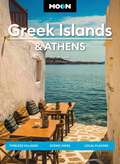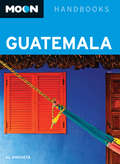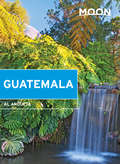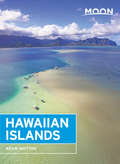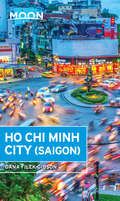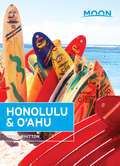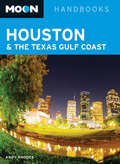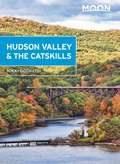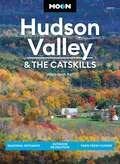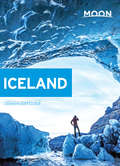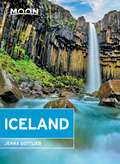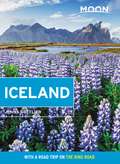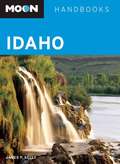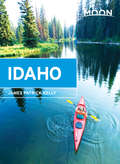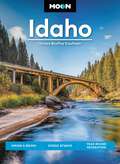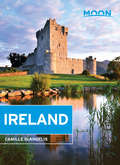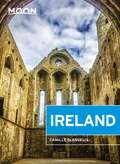- Table View
- List View
Moon Greek Islands & Athens: Timeless Villages, Scenic Hikes, Local Flavors (Travel Guide)
by Sarah SouliSoak up the sun, dance till dawn, hike through wild forests, or explore Greek history: Escape to the Mediterranean with Moon Greek Islands & Athens. Choose the right islands for you, with strategic itineraries for different timelines, budgets, and activities, whether you want to lounge on the best beaches, linger in ancient villages, explore the outdoors, or island-hop for a little taste of everything Focused coverage of Athens and 18 Greek islands, including Santorini, Mykonos, Karpathos, Corfu, Lefkada, and more Unique experiences and must-see highlights: Marvel at Oia's picturesque blue and white architecture or take a boat to the birthplace of Apollo and Artemis. Soak in therapeutic hot springs, hike through lush forests to waterfalls in Samothrace, or hop aboard a boat and discover hidden coves and wild beaches. Learn about local folklore in Olympos, explore Athens' contemporary galleries and ancient ruins, and savor authentic Greek cuisine, from roasted lamb and olives to dakos and fiery shots of ouzo Insight from Athens local Sarah Souli on how to experience Greece like an insider, support local businesses, and avoid over-tourism Full-color photos and detailed maps throughout Background information on the landscape, history, and cultural customs of Greece and each individual island In-depth coverage of: Athens, Santorini, Mykonos, Folegandros, Milos, Naxos, Anafi, Karpathos, Rhodes, Kalymnos, Samothrace, Ikaria, Lesvos, Alonnisos, Skyros, Corfu, Zakynthos, Lefkada, and Crete With Moon's practical tips and local know-how, you can experience the best of Athens and the Greek islands. Exploring more of Europe? Check out Moon Prague, Vienna & Budapest or Moon Southern Italy.About Moon Travel Guides: Moon was founded in 1973 to empower independent, active, and conscious travel. We prioritize local businesses, outdoor recreation, and traveling strategically and sustainably. Moon Travel Guides are written by local, expert authors with great stories to tell—and they can't wait to share their favorite places with you. For more inspiration, follow @moonguides on social media.
Moon Guatemala
by Al ArguetaPart-time Guatemala resident Al Argueta provides travelers with an insider's view of Guatemala's best, from idyllic surf spots to popular volcanoes. Argueta offers in-depth coverage of Lake Atitlan and La Antigua, as well as Guatemala City's diverse selection of museums. With expert advice on where to eat, sleep, relax, and explore, Moon Guatemala gives travelers the tools they need to create a more personal and memorable experience.
Moon Guatemala
by Al ArguetaThis full-color guide includes vibrant photos and detailed maps to help with trip planning.Part-time Guatemala resident Al Argueta provides travelers with an insider's view of Guatemala's best, from idyllic surf spots to popular volcanoes. Argueta offers in-depth coverage of Lake Atitlan and La Antigua, as well as Guatemala City's diverse selection of museums. With expert advice on where to eat, sleep, relax, and explore, Moon Guatemala gives travelers the tools they need to create a more personal and memorable experience.
Moon Hanoi: Including Ha Long Bay (Travel Guide)
by Dana Filek-GibsonYour World Your Way! Explore the soul of Vietnam in this thousand-year-old city of Hanoi with Moon Travel Guides!What You'll Find in Moon Hanoi:Expert, local author Dana Filek-Gibson shares everything she's learned about this bustling city in her adopted countryFull-color guidebook with vibrant, helpful photosDetailed directions and maps for exploring on your own, including information on Ha Long Bay and SapaStrategic itineraries, such as a Ha Long Bay Cruise and A Long Weekend in HanoiActivities for every traveler: Explore the labyrinthine karsts and limestone caves of Ha Long Bay. Learn about Hanoi's history and heroes at the Temple of Literature and the Ho Chi Minh Mausoleum. Soak up the sophisticated energy of Hanoi's art scene and cafe-culture, or go dress-shopping in the city's bustling older neighborhoods. Try a fresh batch of bia hoi, Vietnam's craft beer, or sample the best pho in VietnamAccurate information, including background on the history and cultureHandy tools such as travel tips, safety information, and an easy to navigate format, all packaged in a book light enough to fit in your carry-onWith Moon Hanoi's practical tips, myriad activities, and an insiders view on the best things to do and see, you can plan your trip your way.
Moon Havana
by Christopher P. BakerThe time to visit Havana is now! In 2014, the United States began re-establishing diplomatic relations with Cuba. For the first time in decades, every U.S. citizen can now visit Havana, the most beautiful and beguiling of Caribbean cities.In Moon Havana, award-winning travel writer Christopher P. Baker highlights Havana's most fascinating and unique features, including the Plaza de la Catedral, the enchanting Habana Vieja (Old Havana), and the Museo Ernest Hemingway. He also offers fun and creative travel suggestions, such as "A Week in Havana" and "Havana's Musical Feast."With Moon Havana, you will:Choose the best guides, tours, and means of transportation.Walk the city's most colorful, energetic streetsFind the ultimate mementos-authentic Cuban cigars and rumAppreciate the city's history, from its colonial origins through the revolutionThis full-color guide includes vibrant photos and easy-to-use maps to help with trip planning. With up-to-date information on Havana for new and returning visitors, Moon Havana gives travelers the tools they need to create a more personal and memorable experience.
Moon Havana (Travel Guide)
by Christopher P. BakerMoon Travel Guides: Your World, Your WayEnchanting music, incredible cuisine, and stunning colonial architecture: Havana's beauty and charm captivate everyone who visits. Dive in with Moon Havana.Easy-to-use itineraries, from a revolutionary history tour to a week covering cars, cigars, and cabarets, tailored for adventurers, party animals, artists, beach bums, history buffs, and moreActivities and unique ideas for every traveler: Stroll through Habana Vieja and admire the old-world architecture and plazas lit by gas lanterns. Savor delectable criollo cuisine, indulge in the world's finest cigars, or sip mojitos and cuba libres made from the best Cuban rum. Visit the Museo de la Revolución for a taste of history, or discover the ins and outs of Cuba's nightlife, from salsa dancing to LGBT hotspots. And, don't miss Havana's incredible performance scene: Pick from Rat-Pack-style lounges, Afro-Cuban beats, classical music, Cuban ballet and moreHonest advice from award-winning travel writer Christopher P. Baker on the country he has studied for decadesFull-color photos and detailed maps and directions for exploring on your ownBackground information on the landscape, history, government, and culture, including a Spanish phrasebookA comprehensive guide to travel laws, visas and officialdom, and health and safety tipsEssential insight for travelers on transportation and accommodations, packaged in a book light enough to fit in your carry-onWith Moon Havana's practical tips, myriad activities, and local insight, you can plan your trip your way.Island-hopping around the Caribbean? Try Moon Aruba or Moon Jamaica.
Moon Hawaii: Including Hawaii Volcanoes National Park (Travel Guide)
by Kevin WhittonMake Your Escape with Moon Travel Guides!Unwind on the pristine beaches of Maui, hike the famed coastline of Kaua'i, or experience the melting pot culture of the Big Island. Discover the art of island-hopping with Moon Hawaii, the guide preferred by locals.What You'll Find in Moon Hawaii:Expert author and Honolulu local Kevin Whitton's unique and adventurous perspective on his home stateFull-color photos and easy-to-use maps for navigating independently and island-hopping at your leisureStrategic itineraries for every trip and budget, including: The Two-Week All-Island Trip, One-Week Island Pairings, Best Beaches, Snorkeling and Diving, Best Surfing, Can't-Miss Hikes, and Historical and Cultural SitesIn-depth coverage of each island, with focused information on the best sites and activities, including: Waikiki, Pearl Harbor and the Leeward Coast, Maui's Upcountry, East Maui and the Road to Hana, Lana'i, Moloka'i, Kona, Volcanoes National Park, the Hamakua Coast, Waimea, and the Saddle RoadHonest advice on how to split your time, find the right accommodations, and navigate the islandsActivities and ideas for every traveler: Go for an outrigger canoe ride, learn to surf the legendary waves, or relax on endless stretches of sandy beaches. Visit a piece of American history at Pearl Harbor and explore the burgeoning art and culinary scene of O'ahu's Chinatown. Hike through lava fields, waterfalls, and lush forests, and get your fill of fresh produce at a local farmers market. Sample traditional Polynesian cuisine, or find the best spot for dining, dancing, and sunset romance.Detailed and thorough information, including crucial background on culture, history, and geographyHandy tools such as lodging information, emergency resources, and useful phrasesWith Moon Hawaii's practical tips, myriad activities, and local insight on the best things to do and see, you can plan your trip your way.With Moon Hawaii's practical tips, myriad activities, and local insight on the best things to do and see, you can plan your trip your way.Eager to discover more about a specific island? Try Moon Honolulu and O'ahu, Moon Kaua'i, Moon Maui, or Moon Big Island of Hawaii.
Moon Hawaiian Islands
by Kevin WhittonEach of the Hawaiian Islands offers a world of its own. How can you choose just one? Island hopping is an art, not a science.In this full-color guide, Hawaii resident Kevin Whitton tells you everything you need to know to plan the perfect getaway. The book covers O'ahu, Maui, Lana'i, Moloka'i, Kaua'i, and the Big Island of Hawai'i. Whitton also provides:A strategic two-week itinerary covering all of the islandsTips on how to choose the right island for youOptions for extending your stay on each islandThe perfect island pairings and experiences that complement one another like fine wine added to a great mealInformation on getting from island to island by plane and ferryVibrant photos and helpful planning mapsComplete with details on everything from the best beaches and restaurants to when to go for whale watching, Moon Hawaiian Islands gives travelers the tools they need to create a more personal and memorable experience.
Moon Ho Chi Minh City (Travel Guide)
by Dana Filek-GibsonYour World Your Way! See why the fast-paced, neon-lit Ho Chi Minh City embodies the future of Vietnam with Moon Ho Chi Minh City!What You'll Find in Moon Ho Chi Minh City:Expert, local author Dana Filek-Gibson shares everything she's learned about her bustling adopted hometownFull-color guidebook with vibrant, helpful photosDetailed directions and maps for exploring on your own, including information on the Cu Chi Tunnels, Tay Ninh, Vung Tau, and the Con Dao IslandsItineraries for every trip and budget, including A Long Weekend in Ho Chi Minh City, and Travel to Angkor Wat,Strategic advice on finding the best accommodations, getting around, and experiencing this cultural hub at its finestActivities and trip ideas: Explore the vibrant streets and shops of HCMC. Visit the War Remnants Museum and other historic sights to delve into the city's past. Wander through the multilingual Ben Thanh Market to experience the energy of the city. Sample delicious street food in Northern District 1, representing all the variety southern Vietnam's cuisine has to offerAccurate information, including background on the history and cultureHandy tools such as travel tips, safety information, and an easy to navigate format, all packaged in a book light enough to fit in your carry-onWith Moon Ho Chi Minh City's practical tips, myriad activities, and an insiders view on the best things to do and see, you can plan your trip your way.
Moon Honolulu & Oahu: Including Honolulu And Waikiki (Moon Handbooks Ser.)
by Kevin WhittonMake Your Escape!The ideal balance between lively metropolis and serene shores, O'ahu is the heartbeat of the Hawaiian Islands. See the soul of Hawaii with Moon Honolulu & O'ahu, the travel guide preferred by locals.What you'll find in Moon Honolulu & O'ahu:Expert, local author Kevin Whitton provides an adventurers perspective on his beloved island homeFull-color guides with vibrant, helpful photos, all in an easy-to-navigate formatDetailed directions and over 20 maps for exploring on your ownO'ahu travel itineraries for every trip and budget with options for rainy days, including: O'ahu in Seven Days, Best Beaches, Family Fun, Best Snorkeling and Diving, Hit the Trail, Best Surfing, Historical Sites, Hotspots for HoneymoonersIn-depth coverage for Waikiki, Honolulu, the North Shore, Hanauma Bay and Southeast, Kailua and Windward, and Ko Olina and LeewardHonest advice on finding the best accommodations, accessible transportation, and experiencing the real O'ahuActivities and ideas for every traveler: spot sea turtles as your snorkel the coral reefs, or go whale-watching. Hike, bike, or do yoga on the beach before unwinding at a spa, golfing, or hitting a tennis court. Attend a traditional luau and sample Polynesian cuisine, or visit historic landmarks like Pearl HarborAccurate information, researched by a local, including background on the landscape, plants and animals, history, and cultureHandy tools such as detailed lodging information and suggestions on LGBT+ travel and eco-tourism, all in a book light enough for your beach bagWith Moon Honolulu & O'ahu's practical tips, myriad activities, and local insight on the best things to do and see, you can plan your trip your way. Interested in island hopping? Check out Moon Big Island of Hawai'i, Moon Kaua'i, and Moon Maui. Visiting all the islands? Check out Moon Hawaiian Islands.
Moon Houston & the Texas Gulf Coast
by Andy RhodesTexas resident Andy Rhodes knows the best ways to experience Space City and the surrounding areas, from catching a performance at The Orange Show Monument to hiking through one of the Piney Woods National Forests. Rhodes includes unique trip ideas like Texas Family Road Trip and Houston's Huge History, as well as information on dining, transportation, and accommodations for a wide range of travel budgets. Complete with details on everything from visiting the NASA Space Center to catching some sun in Corpus Christi, Moon Houston & the Texas Gulf Coast gives travelers the tools they need to create a more personal and memorable experience.This ebook and its features are best experienced on iOS or Android devices and the Kindle Fire.
Moon Houston & the Texas Gulf Coast (Travel Guide)
by Andy RhodesThe skyscrapers of Space City, the shoreline of the Gulf, and the intrepid spirit of the Lone Star State: Experience this exciting corner of Texas with Moon Houston & the Texas Gulf Coast. Inside you'll find:Flexible itineraries, from a long weekend in Houston to a road trip through Central Texas and the coastStrategic advice for history buffs, outdoor adventurers, families, and moreThe top sights and unique experiences: Marvel at the original Mission Control at the NASA Space Center or browse the compelling collections at the Contemporary Art Center. Go boating past Spanish moss and cypress trees, kayak along the shore, hike through the Big Thicket Natural Preserve, or spot rare species on a coastal birding trail. Relax on the pristine Padre Island National Seashore, and watch the sun set over the water from the top of a historic lighthouseThe best local flavors: Dig in to authentic, smoky barbecue, classic Tex-Mex staples, and down-home Southern cookingExpert advice from longtime Texan Andy Rhodes on where to stay, where to eat, and how to get around Full-color photos and detailed maps throughoutThorough background on the state's culture, history, geography, and regional vernacularExperience the best of Houston and the Gulf Coast with Moon's practical tips and local insight.Looking to explore more of the Lone Star State? Try Moon Austin, San Antonio & the Hill Country or Moon Texas.
Moon Hudson River Valley
by Nikki Goth ItoiHudson River Valley native Nikki Goth Itoi offers an insider's view of this scenic New York City getaway, from touring the Rockefeller and Vanderbilt mansions to fly-fishing in the Catskills. Nikki is the perfect tour guide, providing unique trip ideas such as Outdoor Highlights and Food Lover's Hudson River Valley. Packed with information on dining, transportation, and accommodations, Moon Hudson River Valley has lots of options for a range of travel budgets. Every Moon guidebook includes recommendations for must-see sights and many regional, area and city-centered maps. Including advice on visiting the Hudson Valley Wineries and skiing and snowboarding on Hunter Mountain, Moon Hudson River Valley gives travellers the tools they need to create a more personal and memorable experience. With expert writers, first-rate strategic advice, and an essential dose of humour, Moon guidebooks are the cure for the common trip.
Moon Hudson Valley & the Catskills
by Nikki Goth ItoiHudson River Valley native Nikki Goth Itoi offers an insider's view of this scenic New York City getaway, from touring the Rockefeller and Vanderbilt mansions to fly-fishing in the Catskills. Itoi also guides travelers to the popular wineries located along Dutchess Wine Trail, as well as the summertime fun offered by Greenwood Lake and winter recreation opportunities at Hunter Mountain. Including great travel itinerary ideas such as Weekends in the Wild, Revolutionary War Route, and Fun for Foodies, Moon Hudson Valley & the Catskills gives travelers the tools they need to create a more personal and memorable experience.
Moon Hudson Valley & the Catskills (Travel Guide)
by Nikki Goth ItoiThe Hudson Valley is a breath of fresh air: explore historic estates, hike wild mountain terrain, and bask in small-town charm with Moon Hudson Valley & the Catskills. Inside you'll find:Strategic, flexible itineraries, from day trips from New York City to week-long road trips and a 6-day bike tour, designed for outdoor adventurers, history buffs, art-lovers, foodies, and moreMust-see highlights and unique experiences: Bike along rolling hills and quiet country roads, hike to rushing waterfalls, hit the slopes in the winter, or discover the best spots to see the striking fall foliage. Take a tour of Washington Irving's romantic home, admire the historic Rockefeller Estate, go antiquing in Cold Spring Village, or stroll through Sleepy Hollow. Take a cooking class at the Culinary Institute of America, browse the produce at a farmers market, sip your way along a Hudson Valley wine trail, or savor local cuisine at a farm-to-table restaurantThe best hikes in the Hudson Valley and the Catskills, with detailed maps, mileage and difficulty ratingsHonest advice from Catskills native Nikki Goth Itoi on when to go, where to eat, and where to stay, from full-service resorts and historic inns to secluded cabins and campsites Full-color photos and detailed maps throughoutThorough background on the culture, weather, wildlife, and history, plus how to get there and get aroundWith Moon's practical tips and local know-how, you can experience the Hudson Valley and the Catskills your way.Exploring more of the Northeast? Check out Moon New England. Headed to the Big Apple? Try Moon New York City or Moon New York Walks.
Moon Hudson Valley & the Catskills: Seasonal Getaways, Outdoor Recreation, Farm-Fresh Cuisine (Travel Guide)
by Nikki Goth ItoiThe Hudson Valley is a breath of fresh air: explore historic estates, hike wild mountain terrain, and bask in small-town charm with Moon Hudson Valley & the Catskills. Inside you'll find:Strategic, flexible itineraries, from day trips from New York City to week-long road trips, designed for outdoor adventurers, history buffs, art-lovers, foodies, and more Must-see highlights and unique experiences: Cycle along rolling hills and quiet country roads, hike to rushing waterfalls, hit the slopes in the winter, or discover the best spots to see the striking fall foliage. Take a tour of Washington Irving's romantic home, admire the historic Kykuit Estate, go antiquing in Cold Spring Village, or stroll through Sleepy Hollow. Take a cooking class at the Culinary Institute of America, browse for produce at a local farmers market, sip your way along a Hudson Valley wine trail, or savor innovative cuisine at a farm-to-table restaurant The best hikes in the Hudson Valley and the Catskills, with trail descriptions, elevation gains, and trailheads Honest advice from Catskills native Nikki Goth Itoi on when to go, where to eat, and where to stay, from full-service resorts and historic inns to secluded cabins and campsites Full-color photos and detailed maps throughoutThorough background on the culture, weather, wildlife, and history, plus how to get there and get aroundWith Moon Hudson Valley & the Catskills' practical tips and local know-how, you can plan your trip your way. Exploring more of the Northeast? Check out Moon New England Road Trip. Headed to the Big Apple? Try Moon New York City Walks. About Moon Travel Guides: Moon was founded in 1973 to empower independent, active, and conscious travel. We prioritize local businesses, outdoor recreation, and traveling strategically and sustainably. Moon Travel Guides are written by local, expert authors with great stories to tell—and they can't wait to share their favorite places with you. For more inspiration, follow @moonguides on social media.
Moon Iceland
by Jenna GottliebIceland resident Jenna Gottlieb reveals the local secrets of her adopted country, from the colorful galleries and humming restaurants of Reykjavik the stunning fjords of East Iceland. Gottlieb recommends unique trip ideas like "Reykjavik: The Urban Experience," "Long Weekend in Iceland," and "Countryside Adventures." Complete with detailed information on glacier hiking in Skaftafell national park, bathing in the hot springs of Myvatn, and watching for sperm whales off the coast of Olafsvik, Moon Iceland gives travelers the tools they need to create a more personal and memorable experience.This full-color guidebook contains vibrant photos and easy-to-use maps to help with trip planning.
Moon Iceland (Travel Guide)
by Jenna GottliebExplore Your World Your Way with Moon Travel Guides! In Iceland, fire and ice meet at the top of the world. Explore it all with Moon Iceland. Inside you'll find:Strategic, flexible itineraries, from a three-day getaway to Reykjavík to a week-long road trip on the famed Ring Road, designed for outdoor adventurers, culture and history buffs, wildlife lovers, and moreUnique experiences and can't-miss activities: Walk across a glacier, hike the rim of a remote volcano, and relax in the milky blue waters of the Blue Lagoon. Drive the Ring Road through stark and beautiful tundra, explore crystalline ice caves and mineral-rich lava tubes, and catch a rainbow appearing over a thundering waterfall. Go whale watching, spot arctic wildlife like puffins and reindeer, and bask in the shimmering glow of the northern lights. Stroll Reykjavík's busy streets, explore incredible museums, unique galleries, and intimate concert venues, and wind down with a handcrafted Icelandic beerFull-color photos and detailed maps throughout Honest advice from local author Jenna Gottlieb on where to eat, where to stay, and when to go, including insight on traveling during the winter Handy tools including an Icelandic phrasebook and critical background information on the landscape, culture, history, and environmentWith Moon Iceland's practical tips, myriad activities, and an insider's view on the best things to do and see, you can plan your trip your way.Country-hopping in Scandinavia? Check out Moon Norway. Heading on to Europe? Try Moon Ireland or Moon Rome, Florence & Venice.
Moon Iceland: Waterfalls, Glaciers & Hot Springs (Travel Guide)
by Jenna GottliebBreathtaking landscapes, unrivaled trekking, and the creative spirit of Reykjavík: experience it all with Moon Iceland. Inside you'll find:Strategic, flexible itineraries, from a three-day tour of Reykjavík to a weeklong best of Iceland, plus a nine-day road trip on the famed Ring RoadUnique experiences and can't-miss highlights: Drive past quaint towns and enormous fjords, hike through Iceland's majestic national parks, and bask in the shimmering glow of the northern lights. Stroll Reykjavík's busy streets, listen to up-and-coming bands at uniquely themed venues, and kick back with a handcrafted Icelandic beer at a local hangout The top outdoor activities: Search for seals, whales, and porpoises off the Icelandic coast or spot arctic wildlife like puffins and reindeer onshore. Trek across a mighty glacier, hike the rim of a remote volcano, and relax in the milky blue waters of the Blue Lagoon. Explore crystalline ice caves and mineral-rich lava tubes or catch a rainbow appearing over a thundering waterfall Full-color photos and detailed maps throughoutHonest advice from local author Jenna Gottlieb on where to eat, where to stay, and when to go, including insight on traveling during the winter Handy tools including an Icelandic phrasebook and critical background information on the landscape, culture, history, and environment Find your adventure with Moon Iceland. Country-hopping in Scandinavia? Check out Moon Norway. Heading on to continental Europe? Try Moon Amsterdam, Brussels & Bruges.About Moon Travel Guides: Moon was founded in 1973 to empower independent, active, and conscious travel. We prioritize local businesses, outdoor recreation, and traveling strategically and sustainably. Moon Travel Guides are written by local, expert authors with great stories to tell—and they can't wait to share their favorite places with you. For more inspiration, follow @moonguides on social media.
Moon Iceland: With a Road Trip on the Ring Road (Travel Guide)
by Jenna GottliebBreathtaking landscapes, unrivaled trekking, and the creative spirit of Reykjavík: experience it all with Moon Iceland. Inside you'll find:Strategic, flexible itineraries, from a three-day tour of the best of Reykjavík to a nine-day road trip on the famed Ring Road, designed for outdoor adventurers, culture and history buffs, wildlife lovers, and moreUnique experiences and can't-miss highlights: Drive past quaint towns and enormous fjords, hike through Iceland's majestic national parks, and bask in the shimmering glow of the northern lights. Stroll Reykjavík's busy streets, listen to up-and-coming bands at uniquely themed venues, and kick back with a handcrafted Icelandic beer at a local hangout The top outdoor activities: Search for seals, whales, and porpoises off the Icelandic coast or spot arctic wildlife like puffins and reindeer onshore. Trek across a mighty glacier, hike the rim of a remote volcano, and relax in the milky blue waters of the Blue Lagoon. Explore crystalline ice caves and mineral-rich lava tubes or catch a rainbow appearing over a thundering waterfallFull-color photos and detailed maps throughoutHonest advice from local author Jenna Gottlieb on where to eat, where to stay, and when to go, including insight on traveling during the winterHandy tools including an Icelandic phrasebook and critical background information on the landscape, culture, history, and environmentFind your adventure with Moon Iceland.Country-hopping in Scandinavia? Check out Moon Norway. Heading on to continental Europe? Try Moon Barcelona & Madrid or Moon Rome, Florence & Venice.
Moon Idaho
by James P. KellySeasoned food, wine, and travel writer James P. Kelly offers his unique perspective on this remarkable travel destination, from free Wednesday night concerts at The Grove in Boise to the bizarre rock outcroppings of the Magic Valley. Kelly uses his local knowledge to craft original trip ideas, including Five Days of Fun in the Sawtooths, Birding in Idaho, and Exploring Backcountry Hot Springs. Complete with details on skiing Silver Mountain, exploring McCall's numerous hot springs, and noshing on contemporary Northwest fare in downtown Nampa, Moon Idaho gives travelers the tools they need to create a more personal and memorable experience.
Moon Idaho (Moon Handbooks)
by James Patrick KellySeasoned food, wine, and travel writer James Patrick Kelly offers his unique perspective on this remarkable travel destination, from free Wednesday night concerts at The Grove in Boise to the bizarre rock outcroppings of the Magic Valley. Kelly uses his local knowledge to craft original trip ideas, including Five Days of Fun in the Sawtooths, Birding in Idaho, and Exploring Backcountry Hot Springs. Complete with details on skiing Silver Mountain, exploring McCall's numerous hot springs, and noshing on contemporary Northwest fare in downtown Nampa, Moon Idaho gives travelers the tools they need to create a more personal and memorable experience.
Moon Idaho: Hiking & Biking, Scenic Byways, Year-Round Recreation (Travel Guide)
by Teresa Bruffey KaufmanEscape to the Gem State and discover a diverse landscape primed for endless adventure. Inside Moon Idaho you&’ll find:Strategic, flexible itineraries for 4-to-5-day road trips to visit Boise's wine country, Sun Valley and Sawtooth's mountains, or the lakes of the Panhandle Outdoor recreation: Raft on the Payette River, take a challenging hike, and paddle pristine turquoise lakes. Bike the Boise River Greenbelt, see multihued wildflowers in bloom, or take in celestial wonders in the first gold-tier dark sky reserve in the U.S. The top activities and unique experiences: Road trip the Thousand Springs Scenic Byway for waterfall photo-ops or experience Basque culture in vibrant Boise. Learn about the state&’s literary legacy or visit a historic ghost town. Savor fresh flavors at a farm-to-table restaurant and kick back with some of Idaho&’s delicious local microbrews Ways to respectfully engage with Indigenous cultures: Shop for handmade goods, visit a museum to learn about Indigenous history, or admire ancient petroglyphs Full-color photos and detailed maps throughoutExpert advice from Idaho local and lifelong adventurer Teresa Bruffey Kaufman Reliable background on the culture, weather, wildlife, and history, plus tips on driving conditions and traveling sustainably Find your adventure with Moon Idaho. Exploring nearby? Check out Moon Montana & Wyoming or Moon Oregon. Passing through? Try Moon Oregon Trail Road Trip.About Moon Travel Guides: Moon was founded in 1973 to empower independent, active, and conscious travel. We prioritize local businesses, outdoor recreation, and traveling strategically and sustainably. Moon Travel Guides are written by local, expert authors with great stories to tell—and they can't wait to share their favorite places with you. For more inspiration, follow @moonguides on social media.
Moon Ireland (Moon Travel Guides)
by Camille DeangelisMoon Travel Guides: Your World Your WayIn its people, legends, and landscapes, Ireland is a living, breathing fairy-tale that ignites the imagination in a way few other places can. Explore the best of The Emerald Isle with Moon Ireland.Moon Ireland features:Curated trip advice for culture and history buffs, outdoor adventurers, foodies, honeymooners, and more, whether you're in Ireland for a few days or a few weeksFull color photos and detailed maps throughoutStrategic itineraries for every budget, passion, and timeline, including: The Top 10 Irish Experiences, Sacred Sites and Pilgrimages, Can't-Miss-Castles, Sporting Ireland, Ghosts of Ancient Ireland, and Family FunFirsthand perspective from Ireland expert, and lifelong lover of its culture, Camille DeAngelisFocused coverage of Dublin and its surroundings (including Meath, Louth, Wicklow, and Kildare), the Southeast, Cork, Kerry, Clare and Limerick, Galway, the Northwest, and Northern IrelandHonest advice on when to go, where to stay, and how to get aroundUnique ideas and can't-miss activities: Visit the Old Library at Trinity College for a look at the world's most famous manuscript, take a breathtaking scenic drive along the Ring of Kerry, or breathe in the misty magnificence of the Cliffs of Moher. Soak up the bohemian spirit of Galway City, view the historic murals of Belfast, or spend a day cycling the Burren in County Clare. Visit a 6th-century monastery, the enchanting Aran Islands, or one of countless picturesque castles. Sample the best traditional cuisine, and head to a pub to order up a pint and experience Ireland's rollicking folk music sceneAccurate, up-to-date information including background on the country's history, landscape, government, and cultureHandy tools such as common local expressions, a guide to Irish cuisine and beverages, tips for traveling with children or as a senior, and suggestions for LGBTQ+ travelWith Moon Ireland's practical tips, myriad activities, and local insight on the best things to do and see, you can plan your trip your way.
Moon Ireland: Castles, Cliffs, and Lively Local Spots (Travel Guide)
by Camille DeAngelisFrom its stirring legends to its stunning landscapes, Ireland is a living, breathing fairy-tale. Ignite your imagination with Moon Ireland. Inside you'll find:Flexible itineraries from a two-week "Best of Ireland" adventure or a weekend in Dublin to 3-day tours of southern, northern, and coastal Ireland that can be combined into a longer tripStrategic ideas for history buffs, outdoor adventurers, foodies, honeymooners, families, and moreUnique ideas and can't-miss experiences: Visit the Old Library at Trinity College for a look at Ireland's most famous illuminated manuscript or drive past picturesque castles along the Ring of Kerry. Marvel at the misty magnificence of the Cliffs of Moher, wander through a 6th-century monastery, and ferry to the enchanting Aran Islands. Soak up the bohemian spirit of Galway City, take an introspective minute at the Bogside Peace Murals, or spend a day biking the Burren in County Clare. Head to a pub to order up a pint and enjoy a traditional meal while you experience Ireland's rollicking folk music sceneHonest insight from Ireland expert Camille DeAngelisFull color photos and detailed maps throughoutThorough background on the country's history, landscape, government, and cultureHelpful tools such as common local expressions and a guide to Irish cuisine and beverages, plus tips for traveling with children, seniors, travelers with disabilities, LGBTQ+ travelers, and travelers of colorFocused coverage of Dublin and its surroundings (including Meath, Louth, Wicklow, and Kildare), the Southeast, Cork, Kerry, Clare and Limerick, Galway, the Northwest, and Northern IrelandWith Moon Ireland's practical tips and local insight, you can experience the best of the Emerald Isle.Expanding your trip to the UK? Try Moon Edinburgh, Glasgow & the Isle of Skye or Moon London Walks.
